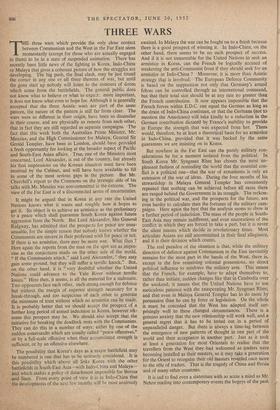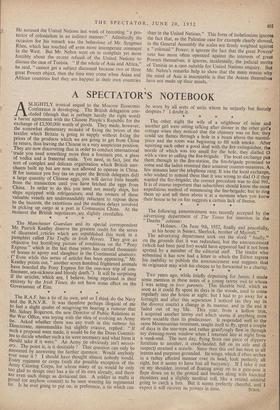THREE WARS
THE three wars which provide the only close contact between Communism and the West in the Far East seem. . momentarily (except for those who are actually engaged in them) to be in a state of suspended animation. There has recently been little news of the fighting in Korea, Indo-China or Malaya that gives a coherent picture of how the struggles are developing. The big push, the final clash, may be just round the corner in any one or all three theatres of war, but until the guns start up nobody will listen to the rumours of doom which come from the battlefields. The general public does not know what to believe or what to expect : more important, it does not know what even to hope for. Although it is generally accepted that the three Asiatic wars are part of the same pattern, the nature of the pattern its still far from clear. The wars were so different in their origin, have been so dissimilar in their course, and are physically so remote from each other, that in fact they are still regarded as separate campaigns. The fact that this week both the Australian Prime Minister, Mr. Menzies, and the High Commissioner for Malaya, General Sir Gerald Templer, have been in London, should have provided a fresh opportunity for looking at the broader aspect of Pacific and South-East Asian, affairs. True, one of the Ministers most concerned, Lord Alexander, is out of the country, but already his 'first impressions on the Korean situation must have been received by the Cabinet, and will have been available to fill in some of the most serious gaps in the picture. But Mr. Churchill's report to the Commons on the strategic side of his talks with Mr. Menzies was non-committal in the extreme. The view of the Far East is of a disconnected series of uncertainties.
It might be argued that in Korea at any rate the United Nations knows what it wants and roughly how it hopes to get it. Its object is to achieve an armistice as the preliminary to a peace which shall guarantee South Korea against future aggression from the North. But Lord Alexander, like General Ridgway, has admitted that the prospects for peace are unas- sessable, for the simple reason that nobody, knows whether the Communists are sincere in their professed wish for peace or not. If there is no armistice, there may be more war. What then ? Here again the reports from the man on the spot are as impre- cise as the conjectures made on the other side of the world. " If the Communists attack," said Lord Alexander, " they may gain some ground, but they will suffer a terrific knock." But, on the other hand, it is " very doubtful whether the United Nations could advance to the Yalu River without terrific losses." Here then, it seems, is all the material for a stalemate. Two opponents face each other, each strong enough for defence but without the margin of superior strength necessary for a break-through, and too suspicious of each other to generate the minimum of trust without which no armistice can be made. It is probably better that we should accept the prospect of a further long period of armed indecision in Korea, however irk- some this prospect may be. We should also accept that the initiative for breaking the deadlock rests with the Communists. They can do this in a number of ways; either by, one of the sudden somersaults which are usually called "peace offensives," or by a full-scale offensive when their accumulated strength is sufficient,, or by an offensive elsewhere.
The possibility that Korea's days as a major battlefield may be numbered is one that has to be seriously considered. It is this possibility which above all links Korea with the other battlefields in South-East Asia—with Indo-China and Malaya— and which makes a policy of detachment impossible for Burma and Siam. From every point of view it is in Indo-China that the developments of the next few months will be most anxiously awaited. In Malaya the war can be fought on to a finish because there is a good prospect of winning it. In Indo-China, on the other hand, there seems to be no such prospect of success. And if it is not treasonable for the United Nations to seek an armistice in Korea, can the French be logically accused of weakening the anti-Communist front if they should seek for an armistice in Indo-China ? Moreover, it is more than Asiatic strategy that is involved; The European Defence Community is based on the supposition not only that Germany's armed fo'Fces can be controlled through an international command, but that their total size should be at any rate no greater than the French contribution. It now appears impossible that the French forces within E.D.C. can equal the German as long as the drain of Indo-China continues, or that the Gen-tans (not to mention the Americans) will take kindly to a reduction in the German contribution dictated by France's inability to provide in Europe the strength that was expected from her. There would, therefore, be at least a theoretical basis for an armistice in Indo-China, provided that it was backed by the same guarantees we are insisting on in Korea.
But nowhere in the Far East can the purely military con- siderations be for a moment isolated from the political. In South Korea Mr. Syngman Rhee has chosen the most un- pleasant fashion of reminding the world that the essential con- flict is a political one—that the war of armaments is only an extension of the war of ideas. During the four months of his stewardship in Malaya General Templer has consistently repeated that nothing can be achieved before all races there are ranged behind the Government in its struggle. The reckon- ing in the political war, and the prospects for the future, are even harder to calculate than the fortunes of the military cam- paigns. Here again the best that the analysis seems to show is a further period of indecision. The mass of the people in South- East Asia may remain indifferent, and even unconscious of the conflict in which they are forced to take a part, but it is never the silent masses which decide in revolutionary times. Most articulate Asians are still uncommitted in their final allegiance, and it is their decision which counts.
The real paradox of the situation is that, while the military direction of defence against Communism in the East inevitably remains for the most part in the hands of the West, there is, except in the few remaining colonial possessions, no direct political influence to reinforce the military arm. This means that the French, for example, have to adapt themselves to, rather than initiate, sudden changes like that in Cambodia over the weekend; it means that the United Nations have to use meticulous patience with the exasperating Mr. Syngman Rhee; and that even, in Malaya General Templer has to do more by persuasion than he can by force or legislation. On the whole it must be conceded that the West has adapted itself sur- prisingly well to these changed circumstances. There is a genuine anxiety that the new relationship will work well, and a general regret that it has to be tested out in a period of unparalleled danger. But there is always a time-lag bettveen the emergence of new patterns of thought in one part of the world and their acceptance in another part. Just as it took at least a generation for most Orientals to realise that the travellers from the West they had welcomed as traders were becoming installed as their masters, so it may take a generation for the Orient to recognise their old masters reverted once more to the role of traders. That is the tragedy of China and Persia and of many other countries.
It is sad to find even a statesman with so acute a mind as Mr. Nehru reading into contemporary events the bogeys of the past. He accused the United Nations last week of becoming " a pro- tector of colonialism in an indirect manner." Admittedly the occasion for his remark was the behaviour of Mr. Syngman Rhee, which has touched off even more intemperate comment in the West. But Mr. Nehru went on to complain yet more forcibly about the ,recent refusal of the United Nations to discuss the case of Tunisia. " If the whole of Asia and Africa." he said, " cannot get a subject discussed because two or three great Powers object, then the time may come when Asian and African countries feel they are happier in their own countries than in the United Nations." This form of isolationism ignores the fact that, as the Palestine case for example clearly showed, in the General Assembly the scales are firmly weighted against a " colonial " Power; it ignores the fact that the great Powers' veto has more often operated against the interests of great Powers themselves; it ignores, incidentally, the judicial merits of Tunisia as a case suitable for United Nations enquiry. But Mr. Nehru's remarks help to show that the main reason why the mind of Asia is inscrutable is that the Asians themselves have not made up their minds.



















































 Previous page
Previous page